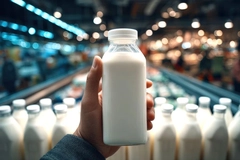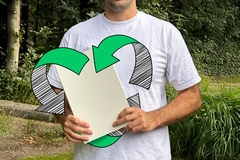German government funds BASF mechanical recycling research
BASF’s SpecReK project aims to find new ways to improve the mechanical recycling of plastics. The €2.2 million (US$2.3 million) project is funded by the German Federal Ministry of Education and Research (BMBF) and carried out by the German chemicals company, in collaboration with Endress+Hauser, TechnoCompound and the Universities of Bayreuth and Jena.
SpecReK is looking at how to “reliably and precisely” identify the composition of plastic waste during recycling in order to improve the quality of recycled plastics. The research team sets out to achieve this by combining measuring techniques with AI.
“We do not currently have the necessary analysis tools to determine during processing exactly which components are contained in the mechanically recycled plastics,” says Dr. Bernhard von Vacano, head of the Plastics Circularity research program at BASF.
According to the company, understanding what components are contained in mechanically recycled plastic is needed to evaluate and improve its quality. “This will enable us to use more mechanically recycled plastics to produce high-quality products and to make recycling processes more efficient and sustainable,” he continues.
“With the increasing demand for high-quality recycled materials, and given the current legal framework, it will be crucial to perfectly understand the material properties and composition of mechanically recycled plastic waste and to optimize the process. In this way, we will strengthen the circular economy.”
Mechanical recycling
BASF outlines three key aspects of the SpecReK project:
- Innovative measuring technologies and AI determine the composition of waste plastics in real-time.
- Improved quality of recycled plastics thanks to precise process steering and use of additives.
- Higher recycling rates to strengthen the circular economy.
The research team is applying spectroscopic methods to interpret how the plastic interacts with light to better understand the chemical structure of the material when recycled. The team will use this data in real-time during the processing to determine which plastic grades, additives and contaminants are contained in the material.
An AI algorithm will then recognize patterns in the measurement data and recommend the additional components that should be added and how the recycling process should be changed to boost the quality of the recycled plastic output.
Currently, most plastic waste sent for recycling is mechanically recycled. It is collected, sorted, crushed, cleaned and melted.
“High-value” plastic
According to BASF, depending on the input material and the degree of sorting, when melted, it can contain different types of plastics, additives and contaminants. For this reason, the quality of the recycled output often varies and is not always sufficient to be transformed back into “high-value” plastic products.
The total project volume is two-thirds financed by BMBF funds from its quantum systems research program and one-third financed by the project partners.
BASF points out that chemical recycling is also an important alternative to have when mechanical recycling of plastic is not technologically feasible or too complex. This allows for even such plastics to be brought back into the material loop and to ensure circularity.
BASF is working to continuously improve both recycling processes — chemical and mechanical — as both are important for a functioning circular economy and can complement each other.












